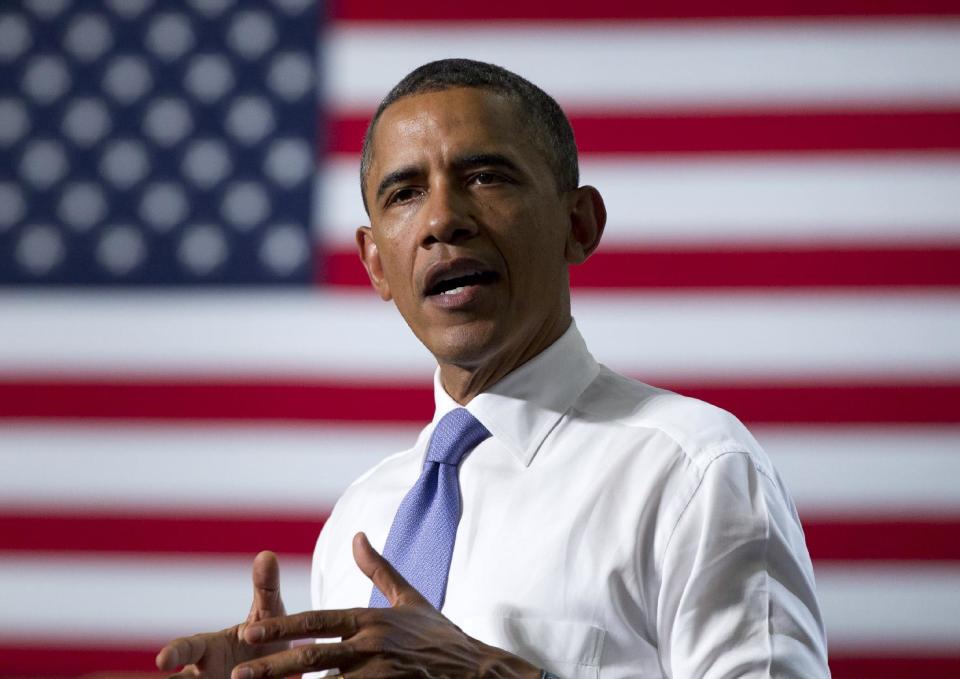Analysis: Court hampers Romney's plea to Hispanics
WASHINGTON (AP) — Mitt Romney wants to improve his troubled standing among Hispanic voters while saying as little as possible about immigration. Events keep working against him.
The Supreme Court's ruling Monday on Arizona's immigration law, coming 10 days after President Barack Obama's announcement that allows some illegal immigrants to stay in the country, is the latest instance. Romney's cautious comments on the court decision underscored his discomfort with a topic that squeezes him between conflicting goals.
He needs to fire up his conservative base, where anti-immigration sentiments run strong. But Romney also needs to reduce Obama's sizeable advantage among Hispanic voters.
Immigration is certainly not the only issue that matters to Hispanics, and Romney is trying to appeal to them by focusing on the economy. That's their No. 1 issue, as it is with other voter groups. But many Hispanics resent what they see as racial and social overtones in some Republicans' denunciations of people who crossed the Mexican border illegally.
If the Nov. 6 contest is as close as many expect, Hispanics could make the difference in swing states such as Nevada, Colorado, Florida, North Carolina and Virginia.
In truth, immigration is a delicate issue for both candidates. Neither seemed overly eager to pounce on the high court's ruling that struck down much of the Arizona law.
While Obama's campaign stayed silent, the president issued a statement praising much of the decision. However, Obama said, "I remain concerned about the practical impact of the remaining provision of the Arizona law that requires local law enforcement officials to check the immigration status of anyone they even suspect to be here illegally."
In a comment that might resonate with minority citizens everywhere, the president added: "No American should ever live under a cloud of suspicion just because of what they look like."
Romney, meanwhile, made two brief statements Monday that largely avoided details of the Arizona law and the court ruling.
"Given the failure of the immigration policy of this country," he told donors in Scottsdale, Ariz., "I would have preferred to see the Supreme Court give more latitude to the states."
Earlier, he said that Obama "has failed to provide any leadership on immigration." Romney suggested that Arizona never would have drafted its law if Congress, under a strong president's guidance, had enacted a federal policy "to secure our borders and preserve the rule of law."
Congress has deadlocked on immigration policy for years, under Republican and Democratic presidents alike.
In the GOP primaries, Romney rejected charges that he was "the most anti-immigrant candidate" in the field, as a Newt Gingrich radio ad claimed. Romney had criticized Texas Gov. Rick Perry for granting in-state college tuition to illegal immigrants. And he distanced himself from Gingrich's call for a de facto policy of declining to deport illegal immigrants who have led long, stable and crime-free lives in the United States.
Romney began softening his immigration rhetoric after vanquishing his Republican rivals. But Obama complicated matters on June 15. The president said he would not deport young illegal immigrants who attend school and avoid crime, a move that Hispanic groups widely praised.
Romney and his surrogates have repeatedly declined to say whether he would overturn that policy, even as they have criticized Obama for failing to craft "a long-term solution" to immigration.
Ana Navarro, who has advised GOP governors and was national co-chair of John McCain's Hispanic Advisory Council in 2008, said Monday via Twitter: "As a Republican Hispanic, trying to put positive spin on Romney immigration (non)statements, well, let's just say it ain't easy."
A new USA TODAY/Gallup Poll of Hispanic registered voters highlights Romney's challenge. Obama led Romney, 66 percent to 25 percent. In 2008 Hispanics voted for Obama over McCain, 67 percent to 31 percent, according to an analysis by the Pew Hispanic Center of exit polls.
What's more: a December poll of Republican primary voters by the Pew Research Center suggests Romney could alienate his GOP base if he softens his immigration stands too much. It found that 57 percent of Republican voters 65 and older said tighter border security and tough law enforcement should be the only focus of immigration policy, with no path to citizenship for illegal immigrants. Younger Republican voters backed a somewhat more balanced approach, but their turnout is less reliable than older voters'.
Republican strategists note that jobs and the economy are the top issues for Hispanics. And they warn that Hispanic voters, who are citizens and often multi-generation Americans, are not entirely sympathetic to people who enter and stay in the country illegally.
But several top Democrats framed the Arizona case in terms that might touch a broad swath of Hispanic voters and other minorities. These Democrats said the Arizona law — drafted by Republicans, and strongly opposed by Obama — can lead to humiliating stops and police interrogations of non-white citizens.
The Supreme Court rejected provisions of the Arizona law that would have made state crimes out of federal immigration violations. But it upheld the "show me your papers" provision, which requires police to check the status of people stopped for various reasons who might appear to be in the U.S. illegally.
Rep. Luis V. Gutierrez, D-Ill., chairman of the Congressional Hispanic Caucus' Immigration Task Force, said: "Experience has shown us that police are highly unlikely to stop an individual with the last name of Kennedy or Roberts on suspicion of not being a legal U.S. citizen, but if you are a Gutierrez or Martinez, watch out."
Romney has said laws such as Arizona's should not lead to racial profiling. He has less than five months to try to eat into Obama's lead among Hispanic voters. He hopes an agenda built around economic opportunity will do the trick. Meanwhile, it's a good bet that he'd be happy if talk about immigration died down.
___
EDITOR'S NOTE — Charles Babington covers national politics for The Associated Press.



